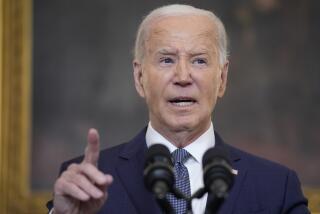Phased funding for Iraq war may be Democrats’ next move
WASHINGTON — Determined to keep up pressure on the White House and congressional Republicans to support a troop pullout from Iraq, House Democratic leaders have begun to coalesce around a plan to link continued funding for the war to progress by the Iraqi government.
Under the proposal, which was still being worked out Thursday, the war funding bill would only guarantee money for military operations in Iraq and Afghanistan through July, according to Democratic sources familiar with the proposal.
The plan would require lawmakers’ approval for further funding after Congress got a report in July from the Bush administration on Iraqi government progress on benchmarks including militia disarmament and laws to equitably share oil wealth. The second measure would fund the war through September.
The federal fiscal year begins Oct. 1, when war funding could be included in the new year’s budget.
The Democratic plan was coming together just days after President Bush vetoed a $124-billion emergency war spending bill that would have set a timeline for withdrawing troops.
The plan faces substantial obstacles before it makes it to the president’s desk.
Senate Democratic leaders have expressed reservations about funding the wartime military operations for just a few months at a time.
The president has repeatedly insisted that Congress send him a war funding bill that does not impinge on his role as commander in chief and pays for military operations through the end of the fiscal year.
Senate Majority Leader Harry Reid (D-Nev.) met Thursday morning in his Capitol office with White House Chief of Staff Joshua B. Bolten.
Reid declined to say what Democrats would do next.
At the White House, spokesman Tony Snow characterized the exchange as “a good meeting” but declined to elaborate.
Meanwhile, two Democratic senators -- West Virginia’s Robert C. Byrd and New York’s Hillary Rodham Clinton -- announced plans to press the Senate to revoke the resolution passed by Congress in 2002 that authorized the president to use force in Iraq.
In the House, Speaker Nancy Pelosi (D-San Francisco) has not publicly unveiled the new plan. But Pelosi and Rep. David R. Obey (D-Wis.), the chairman of the House Appropriations Committee and the lead author of the war spending legislation, have started talking to Democratic lawmakers about the plan.
The proposal could offer a way to unify the Democratic Party and keep up members’ momentum in their drive to force an end to the 4-year-old war.
Many rank-and-file members want the Iraqi government to be pressured more to reach political reconciliation as American troops work to pacify Baghdad and other parts of the country.
And antiwar lawmakers have been asking party leaders not to send the president a bill that funds the war without conditions.
Democrats hope to pass a bill by Memorial Day.
While Democrats were planning their next move, the new commander of U.S. forces in the Middle East, Navy Adm. William J. Fallon, criticized the performance of the Iraqi government.
At a Senate Armed Services Committee hearing Thursday, Fallon said Prime Minister Nouri Maliki’s progress thus far had been disappointing.
“They are not moving, in my opinion, fast enough to support what we’re trying to do,” said Fallon, the head of the U.S. Central Command in Tampa, Fla.
Later in the hearing, he said: “That’s the No. 1 question in my mind is their ability as well as willingness to do this.”
*
Times staff writer Peter Spiegel contributed to this report.
More to Read
Sign up for Essential California
The most important California stories and recommendations in your inbox every morning.
You may occasionally receive promotional content from the Los Angeles Times.











